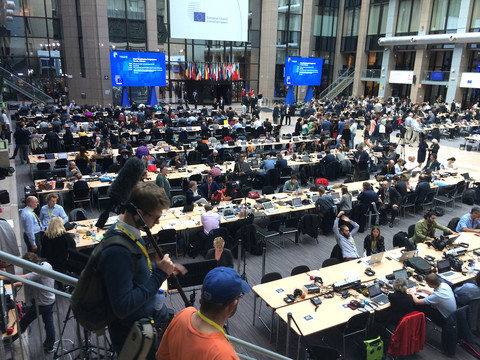[ad_1]

Even if EU member states lead the world in press freedom, the EU itself is becoming more and more divided, the new annual report on media freedom by Reporters Without Borders (RSF) said on Tuesday (20 April).
“Challenged by ‘illiberal democracies’, the ‘fight against terrorism’, and the economic crisis, it has largely lost its leadership capacity,” the report said of the EU.
The World Press Freedom Index found that Norway, Finland, Sweden and Denmark lead the world ranking of 180 countries, while – among EU members – Malta, Hungary, and Bulgaria have the lowest ranking.
The Covid-19 pandemic has been used globally as grounds to block journalists’ access to information sources and reporting in the field, the RSF said.
“Violations of the right to inform, and be informed, were evident in several European countries,” its report said.
Migration has also continued to be a sensitive topic to cover in the EU.
In Greece, authorities arrested journalists to prevent contact with migrants, and Spain also used ways of obstructing journalists reporting on migrants.
Illiberal inspiration
The new EU mechanisms to protect fundamental freedoms have yet to challenge Hungarian prime minister Viktor Orbán’s grip on his country’s media “or halt the draconian measures being taken in other central European countries”, the report said.
“Orbán managed to complete his country’s adaptation of an alternative European model, that dispenses with press freedom altogether,” the report said, highlighting the closure of Klubradio and the hollowing out of Index.hu in 2020.
Hungary’s increasing control over media freedom has become a “source of inspiration” for other EU member states and accession countries, the report warned.
In Poland, which has dropped to its lowest-ever position in the Index, some media have been turned into government propaganda outlets, while the Slovenian news agency STA said it has been deprived of state funding if they refuse to toe the government line, the report said.
Privately-owned media are exposed to tax, commercial, and legislative, pressure in Poland – where the government said it wanted Polish media ownership to increase.
Increased violence
Violence against journalists in Europe has also increased.
A lack of justice for crimes of violence against journalists, particularly in Slovakia and Malta following the murder of investigative journalists Jan Kuciak and Daphne Caruana Galizia respectively, can have a chilling effect, the report warned.
Many reporters have been physically attacked by members or supporters of extremist and conspiracy-theory groups during protests against coronavirus restrictions – especially in Germany and Italy.
In Greece and France, reporters have been victims of police violence or arbitrary arrests during protests. In Bulgaria, authorities refused to investigate a case of police violence against a freelance journalist.
Pandemic impact
The annual report found that journalism was “totally blocked or seriously impeded” in 73 countries, while it was “constrained” in 59 others.
Many governments had used the pandemic to worsen repression.
“Journalism is the best vaccine against disinformation,” RSF secretary-general Christophe Deloire said in a statement.
The report added that the persecution of government critics in Russia and Turkey has reached levels not seen for two decades.
China, which continues to take internet censorship, surveillance, and propaganda, all to unprecedented levels, is still firmly anchored among the index’s worst countries, the report said.
Falling trust in journalists globally is also part of the problem, which is fuelled by political polarisation and online misinformation.
Reporters Without Borders cited a recent survey by the Edelman Trust that found 59 percent of respondents across 28 countries believed journalists deliberately misled the public.
[ad_2]
Source link